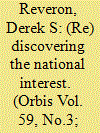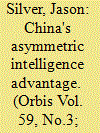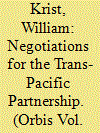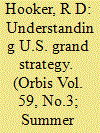|
|
|
Sort Order |
|
|
|
Items / Page
|
|
|
|
|
|
|
| Srl | Item |
| 1 |
ID:
143254


|
|
|
|
|
| Summary/Abstract |
There is an enduring consensus about America's role in the world, which is due to the fact that while administrations may change, fundamental U.S. interests have not. These include protecting the U.S. homeland from catastrophic attack, sustaining a global system marked by open lines of communication to facilitate commerce, and preserving regional balances of power. Far from being a reluctant imperialist or hegemon on the offensive, the United States tends to fill security voids when they are created (even if often late to the game) to ensure the international system remains functional. To be sure, future U.S. grand strategy will be global and multilateral, but it will be much more selective than it is today.
|
|
|
|
|
|
|
|
|
|
|
|
|
|
|
|
| 2 |
ID:
143259


|
|
|
|
|
| Summary/Abstract |
China's government has the ability to compel Chinese companies and its citizens working in the United States to assist the Chinese government with the broadly defined mission of “safeguarding State security.” As such, new safeguards should be put in place to better protect U.S. national security. These safeguards must ensure that the industries which make up the U.S. critical infrastructure are better protected. By mimicking Chinese trade and investment policies as appropriate and by using existing trade tools and strengthening the Committee on Foreign Investment, the United States may be able to reduce the asymmetric advantages afforded to the Ministry of State Security via the State Security Law of 1993.
|
|
|
|
|
|
|
|
|
|
|
|
|
|
|
|
| 3 |
ID:
143261


|
|
|
|
|
| Summary/Abstract |
While force planners must think about what the future security environment might look like, what technologies might be available, and how future forces might leverage these emerging technologies to meet the challenges of a future security environment, they must always be cognizant of domestic structural factors. The author argues that a force planner must always be guided by a coherent strategic logic. Structural factors can never be eliminated but a strong strategic rationale can minimize them.
|
|
|
|
|
|
|
|
|
|
|
|
|
|
|
|
| 4 |
ID:
143256


|
|
|
|
|
| Summary/Abstract |
The Trans-Pacific Partnership, a free trade agreement under negotiation among the U.S. and 11 other countries, would have an enormous impact on world trade and would advance U.S. foreign policy interests. However, several modifications are needed if this agreement is to be a good template. Negotiators should ensure that the rules which are designed to promote international investment do not weaken regulators’ ability to promote the public welfare. It is crucial that the rules on intellectual property protection do not result in more costly pharmaceuticals. And most importantly, negotiators need to address currency manipulation.
|
|
|
|
|
|
|
|
|
|
|
|
|
|
|
|
| 5 |
ID:
143257


|
|
|
|
|
| Summary/Abstract |
After assessing the “pivot” to Asia, the author contends that now is the time to split the rebalance of Asia in two—Northeast and Southeast Asia. Northeast Asia poses the more complicated challenge. The Northern Triangle of China, Russia and North Korea (despite appearances) is drawing together, but the U.S.-Japan-ROK Alliance is at an impasse. Serious differences exist between Japan and South Korea. Without this bilateral relationship working well, the rebalance to Northeast Asia is hampered in dealing with North Korea's regional diplomatic strategy, the regional strategy of Russia to transpose its notion of a “new Cold War” to the east, and the Chinese strategy of weakening U.S. alliances. U.S. rebalancing success versus determined adversaries has little chance unless Seoul and Beijing are in greater agreement.
|
|
|
|
|
|
|
|
|
|
|
|
|
|
|
|
| 6 |
ID:
143258


|
|
|
|
|
| Summary/Abstract |
A historic rapprochement is transforming the Taiwan Strait, which until recently had been considered a “flashpoint” in Asia that could embroil two nuclear powers. This détente occurs amidst a momentous power transition in the Asia-Pacific. Many see the U.S. “Pacific Pivot” as a response to China's recent assertive policies, the shifting power balance caused by the 2008 global financial crisis, and the realization that Asia holds the key to the economic and security futures of the United States. And yet the Obama Administration's official statements on the pivot policy were nearly silent on Taiwan. What explains the near official silence on the role of Taiwan in the U.S. pivot policy? This article examines three hypotheses: (1) “The Lost Cause” thesis (i.e., Pivot without Taiwan), (2) “The Fate Undetermined” thesis (i.e., Pivot, then Taiwan), and (3) “The Tacit Alliance” thesis (i.e., Pivot with Taiwan, in deed if not in word) against available evidence and assesses the positive and negative implications of the evolving cross-strait relations for the U.S. pivot to Asia, as well as the U.S. policy's impact on cross-strait relations
|
|
|
|
|
|
|
|
|
|
|
|
|
|
|
|
| 7 |
ID:
143260


|
|
|
|
|
| Summary/Abstract |
The current Ukraine crisis is often portrayed as a contest between Ukraine's desire to adopt West European standards of living and its historical pull towards Russia's sphere of influence. This ostensibly has made Ukraine unable to tilt successfully either toward the European Union or Russia. Yet, this narrative has neglected that Ukraine is significant precisely because of its geographical position and its role as a transit country for Russian gas en route to Europe.
|
|
|
|
|
|
|
|
|
|
|
|
|
|
|
|
| 8 |
ID:
143255


|
|
|
|
|
| Summary/Abstract |
At its best, grand strategy is not fundamentally about the military application of force, but rather an appreciation of its potential, along with the other instruments of power, in the mind of the adversary. Effective grand strategy may often preclude the need to resort to force. To achieve this, a society's involvement in its own national defense, a strong, stable and globally networked economy, an effective domestic politics that can make rational decisions over time in support of national security, and the promotion of values that invite support and consensus at home and abroad.
|
|
|
|
|
|
|
|
|
|
|
|
|
|
|
|
|
|
|
|
|